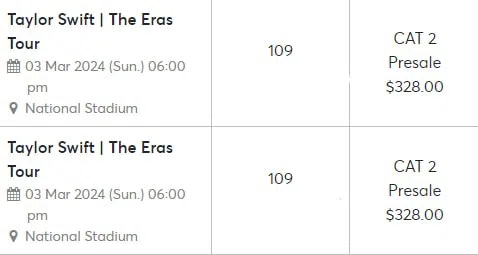‘Willing buyer, willing seller’: How and why ticket scalpers do what they do
Sign up now: Get ST's newsletters delivered to your inbox

On Taylor Swift group chats, many have expressed anger at ticket scalpers who resell concert tickets at prices higher than the original.
PHOTO: NYTIMES
SINGAPORE – After listing more than 20 Taylor Swift tickets on Carousell for more than triple the price per ticket, Timothy (not his real name) became a target of ire for the American superstar’s die-hard fans.
Swifties posted his account on several social media platforms and called on users to report him for scalping.
“Don’t buy from this scalper, the price is just too high,” said one fan.
“This scalper definitely used many bots to purchase these tickets,” added another.
However, Timothy, a full-time national serviceman, told The Straits Times that his operation involved no bots but five other men, who are all his friends.
The group decided to purchase bulk tickets to make “some pocket money”, he explained.
Instead of bots – or autonomous computer programs – Timothy and his friends relied on nearly 150 manually created e-mail accounts to obtain the access codes needed to purchase the tickets.
Multiple browsers were used, but not one of the friends camped or queued at a single SingPost outlet.
Timothy said he and his friends previously sold limited-edition sneakers on a Telegram channel, and this gave them experience with online transactions.
“Many people, or rather fans, often mistake (the practice) as ‘botting’ something,” he said. “We heard that term often among the community of those that resell sneakers.”
Swift will hold six concerts at the National Stadium in March,
The group listed prices for tickets at $1,200 for Category 1, $1,000 (Cat 2), $650 (Cat 5) and $600 (Cat 6). The original prices were $348, $328, $168 and $108, respectively.
On Taylor Swift group chats, many have expressed anger at scalpers like Timothy.
Documents teaching individuals how to report scalpers to Carousell and Ticketmaster have been circulated. Some comments have been extreme, telling scalpers to “go and die”, while others only lament that it is “disheartening” to see people engage in outright profiteering.
But the situation is simply a case of willing buyer, willing seller, said economist Song Seng Wun.
“A surge in demand creates an opportunity for people to provide that supply,” he said.
“People will pay money to those who can provide the supply for what they are demanding. It is just economics.”

Along with his group of friends, Timothy managed to purchase bulk tickets for many concerts to make some pocket money.
PHOTO: COURTESY OF TIMOTHY
One buyer, who wanted to be known only as Tzepie, bought four Cat 1 tickets for Swift’s March 3, 2024, concert. She paid $875 for each ticket, over $500 more than the original price.
Showing a picture she took with the pop star in 2015, the 23-year-old said she was “desperate”.
Fans like Tzepie are aware that scalpers take advantage of their desperation and that there are risks in purchasing tickets from them.
In some cases, fake tickets are sold. There are also instances where scalpers disappear once the money is transferred.
“But we live in a world of capitalism and (we know) if there is demand with little supply, the prices will go up,” said Tzepie.
Another buyer, who wanted to be known only as Chloe, said a ticket for a concert in April by K-pop boy group TXT that was originally priced at $348 was sold to her for $638. Like Tzepie, she was desperate.
“It was one week before the concert, and I could not find anything cheaper,” she said, adding that she had exhausted all official avenues during both the pre-sale and general sale. She had also asked a friend to try to get tickets for her.
“Scalpers are the definition of selfish, but some make over 200 per cent profit when selling tickets, and I guess that is what encourages people to (scalp),” she added.
Although scalping is not illegal, if a ticket buyer is found to have put up his ticket for resale, the original seller is allowed to seize or void the ticket without providing a refund, according to online legal resource Singapore Legal Advice. This is because the reseller may be violating a term of the original ticket sale.
For instance, Kallang Alive Sport Management (KASM), which owns and operates the Singapore Sports Hub, which includes the National Stadium where Swift will hold her concerts, has a list of conditions for entry listed on its website.
For events at the National Stadium, KASM has the right to “check identification of any ticket holder upon entry” and refuse entry to, or remove any person from, the venue if a ticket is “damaged, defaced, forged or copied, or not purchased from a box office or online from the official ticketing operator”.
When asked what he would do if he was unable to resell all the tickets he and his friends bought, Timothy said that he and his friends would “go for the concert and maybe ask some of our friends too”.
In the event the tickets are seized, however, even the ticket reseller himself would not be able to use the ticket to attend the event, stated Singapore Legal Advice.
Dr Seshan Ramaswami, an associate professor of marketing education at Singapore Management University, said scalping is an expected consequence of a market in which demand greatly exceeds supply, especially when the product or service is perishable.
This is not just the case for concert tickets, he said. It applies even to limited releases for items such as toys, games and shoes.
“We should note that the ones who manage to buy the tickets at the stated prices have also usually paid a high price in other ways,” said Dr Ramaswami.
“For example, they pay with time by queueing up early, by setting up multiple accounts to increase chances, (or) by opening a bank account at a new bank to get an additional shot at a ticket.
“So when demand exceeds supply, everyone is paying a higher price. The scalper is just monetising the effort to get the ticket.”
He added that scalping cannot be eradicated, and suggested that it is “not particularly morally reprehensible”.
“No one is forcing anyone to go to a concert or to spend a lot of money on a ticket,” said Dr Ramaswami. “Designer goods and collectibles are often priced very high too; if there is a willing buyer at that price, we don’t shame the seller for charging a high price.”
However, scalping is unethical when the commodity becomes a necessity, he said, citing examples like the increase in prices of bottled water in a natural disaster, or face masks at the onset of the pandemic.
“In those cases, it is best for the industry to be tightly regulated or to have the government take over temporarily so that prices remain affordable for the masses,” he added.
There is no perfect solution for those hoping the authorities can put a stop to scalping, said Mr Andrew Tan, a consulting partner at Ernst & Young Advisory.
He noted that Singapore does have the infrastructure to support identification-based ticketing to prevent the use of artificial intelligence or bots, citing Singpass as an example.
“However, there needs to be a balance between putting in place too many restrictive rules versus keeping (the ticket purchasing process) untracked for scalpers to take advantage of,” said Mr Tan.
“Implementing a transferable ID-based purchase would be easily circumvented via scalpers on a network of pass holders, while a non-transferable ID-based purchase would create inconvenience and impede addressable markets such as foreign visitors who may be keen to attend the concert or event as well.
“All these would increase risks to sales that organisers may not be willing to take.”
Chloe, who managed to buy a ticket for herself, urged Swift fans not to purchase from scalpers yet, saying this would force them to drop their prices.
“As we get closer to the concert date, scalpers will scramble to drop their prices because most don’t want to waste (the potential profit on) that extra ticket,” she said.
“We just need to be patient, and they will drop their act.”



